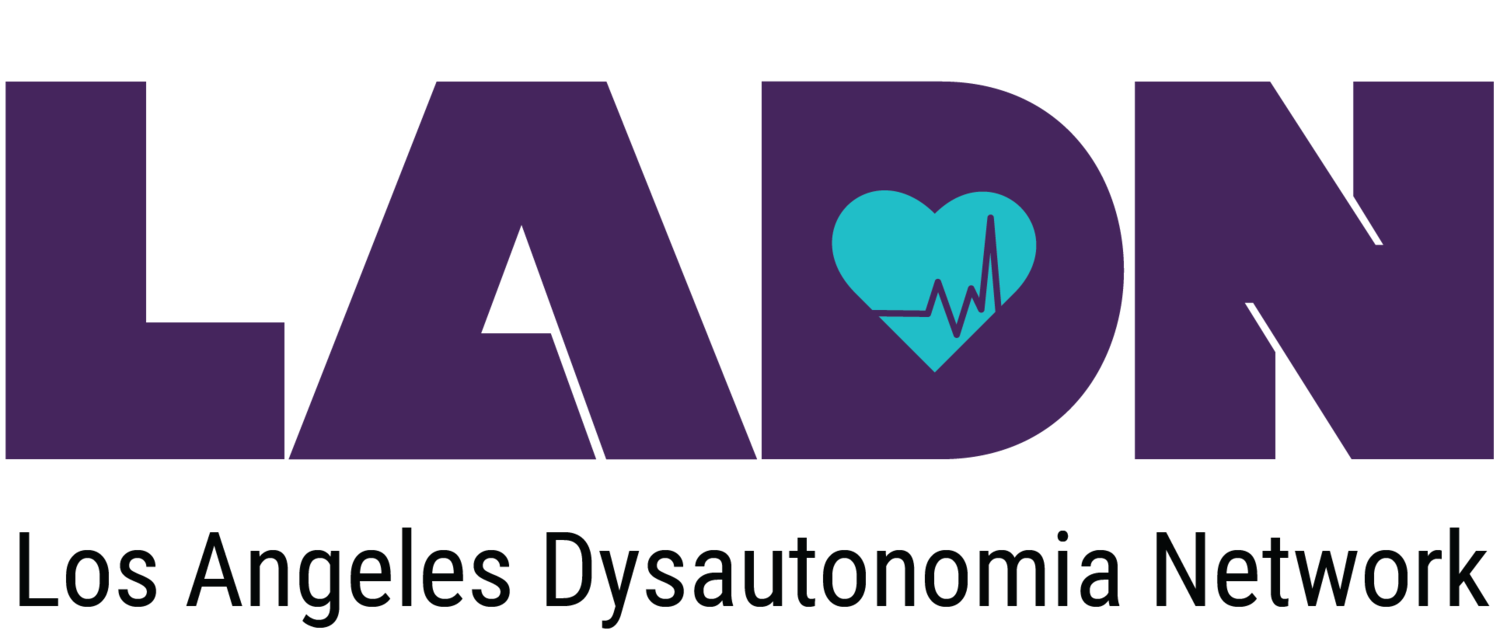LADN Executive Director Sally Krueger-Wyman on the Ebbs and Flows of Her Lifelong Dysautonomia
Hi there! My name is Sally Krueger-Wyman, and I’m the Executive Director and Co-founder of Los Angeles Dysautonomia Network.
I have had dysautonomia since I was 7 or 8, so about twenty-five years now. I have experienced a variety of fluctuating symptoms, but the most disabling by far has been severe brain fog, often robbing me of my ability to speak and making me feel lost within my own brain.
Throughout my life, I’ve dealt with low blood pressure, tachycardia – or high heart rate, painful GI issues such as IBS and gastroparesis (sometimes triggering cyclical vomiting that would require emergency treatment), joint issues, super sensitive skin, extreme fatigue, and an extra susceptibility to illnesses such as colds and flus. In addition to dysautonomia, I also have Hashimoto’s Thyroiditis, Ehlers Danlos Syndrome, and Mast Cell Activation Syndrome.
It was difficult to grow up with dysautonomia. My complex health issues forced me onto a very different life path, one full of isolation, pain, and continual challenges as well as unexpected joys, triumphs, and eventually new, wonderful friends. I was ill without answers for so many years. I don’t know if this was harder on me or my parents! Even once I was finally diagnosed with POTS at age thirteen, I spent over a decade trying to find the right treatment options.
My illness really impacted my ability to attend school and eventually to work. Despite being an academically-minded person, I did much of my education, high school and college, online in order to accommodate my health needs. I missed tons of school, including formal medical leaves in both high school and college. In college in particular, I experienced a real culture of shame. While I had accommodations from the school, I was left to advocate for myself at a time when I lacked the confidence and knowledge or guidance to do so. Teachers said things to me like “well, we wouldn’t want it to be unfair to the other students,” and every one of them assigned me extra work for every class I missed due to illness. I literally did double the workload because I was so ill. And instead of having a wonderful social life, I had conversations with random dudes who decided to comment on my use of a handicapped placard – “must be nice,” one said, assuming I was cheating the system. I felt so ashamed of my inability to be well. And I was as sick as I’d ever been – to the point where continuing to pursue my education would have been too great a risk for my health. I left school and returned home.
I dedicated myself completely to getting healthy, and none of it worked. I felt hopeless and so very alone. I experienced depression for the first time in my life. I had frequent episodes of being unable to talk or sit upright because of my brain fog. I remember one night having to call my mom at two in the morning while I was sitting on the toilet, because I was passing out while having diarrhea. Not a fun story to share, but even less fun to experience. I was way too ill to do any type of job and things didn’t seem likely to change.
I finally got in to see a POTS specialist, cardiologist Dr. Ahern, now retired, who had me do a tilt table test with a transcranial doppler, this thing they put on your head that measures the velocity of blood flow in my brain. I was told I experience very extreme drops in cerebral blood flow velocity when my body goes from recumbent to vertical, which explained the severe brain fog. We tried a barrage of medicines and treatments, with mixed results. I was still so ill.
I tried to meet people going through similar challenges, even helping to start a local support group for people with chronic illnesses. Then Emily put out the call on Facebook to start a POTS-focused support group in Pasadena, and my life was changed. I made many friends who understood me and what I was going through – I didn’t have to explain! And my goodness they were they knowledgeable. I learned about Mast Cell Activation Syndrome. I think back to the young, young child who was constantly breaking out into rashes and having an upset stomach and see all the signs my doctors and I didn’t know how to interpret then! Treatment for MCAS is why I’m talking to you well today. Cromolyn sodium and antihistamines cleared up my brain fog, my hardest symptom, and I was able to start making progress.
In January of 2020, almost five years after leaving college, I enrolled in college online and was able to complete my degree. Just this fall, I’ve started graduate school in-person at USC for a Masters in Nonprofit leadership and management. I still have bad days – that’s for sure. But right now, I can assume that I’ll wake up to a good day, which is not an assumption I’ve ever been able to make in my life before. What a gift! And a gift for which I thank my LADN community. I have learned so much from my LADN peers – about dysautonomia and co-morbidities and treatment options. And they have filled up my heart with their caring and friendship. I love my LADN community so much. And I am thrilled to be able to work in a field I find exciting and purposeful.
My dysautonomia journey continues, affecting me daily, as it likely will for my whole life. But I am able to life a full, happy life, in a way I didn’t think I’d be able to. So thank you to my LADN community. And thank you for listening to my dysautonomia journey!
